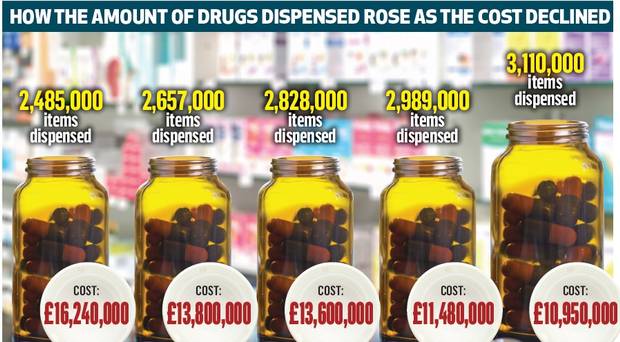

By Lauren Harte
December 31 2018
The number of antidepressants issued in Northern Ireland has surged by 25% in five years.
In the past year alone, more than 3.1million prescriptions were handed out – 8,500 a day on average, and up from 2.4m in 2013/14.
Across that five-year period, the cost of treating depression came to more than £66m.
The figures, described as “staggering”, have led to calls for more work to treat mental illness.
Previous studies have shown that Northern Ireland has one of the highest rates in the world for use of anti-depressants.
And official figures suggest demand is increasing.
In 2017/18 a total of 3,110,000 anti-depressant prescriptions were issued here, according to the Health and Social Care Board.
Figures show a steady increase in the last five years.
In 2013/14, some 2,485,000 prescriptions were issued; rising to 2,657,000 in 2014/15, 2,828,000 in 2015/16 and 2,989,000 in 2016/17.
In that five-year period the total spend comes to £66,070,000.
While annual expenditure on prescriptions has fallen, from £16.24m in 2013/14 to £10.95m in the last year, that is likely the result of more cost-effective medication being issued.
Ulster Unionist Health spokesperson Roy Beggs said the latest figures are “hugely concerning”.
He added: “Whilst I’m glad that the costs have fallen over the last five years, it is worrying that the actual number of antidepressant items dispensed has continued to grow year-on-year.
“I suspect much of the increased use of the drugs is as a result of better identification and diagnosis of mental health conditions within the medical profession, as well as more people realising themselves that they need some form of medical support.
“Antidepressants, when used appropriately, are effective drugs and they do help a lot of patients. But there are risks that come with their use. Often people can come to depend upon the drugs, even long after they are deemed to medically require them.
“It is essential that all options – not just medicinal – are explored. Having spoken to many staff working across mental health services in recent times I am aware for instance that increasing emphasis is being placed on alternative treatments such as talking therapies.”
The SDLP’s health spokesperson Mark H Durkan added: “These figures, while staggering, are unfortunately not surprising.
“Firstly, it is devastating that such high numbers in Northern Ireland are being treated for depression. Secondly, it is equally devastating that medication is all too often the first way to treat mental ill-health.
“We must be more ambitious when it comes to tackling depression here. More money should be channelled into resourcing more therapeutic intervention, as well as early intervention; not only for the financial implications but for social implications, as many people can become addicted to antidepressant medication.
“For some time, it has been well evidenced that our battle with mental ill-health in Northern Ireland is unique, as highlighted by the disparity between costs spent on antidepressants between here and England. We urgently need a bespoke plan to tackle our growing mental health problem here.”
Previous studies showed that antidepressants were prescribed to 12% of Northern Ireland’s population in 2011 with this rate rising to 14% by 2015 – around one in seven of the population.
Earlier this year it emerged that nearly 12,000 prescriptions for anti-depressants were issued to children and adolescents in Northern Ireland in 2017/18.
Figures showed a rise of six per cent in prescriptions handed out to young people here over the past three years.
The statistics related to a group of medicines called selective serotonin reuptake inhibitors (SSRIs), which are used to treat depression and anxiety conditions.
A spokesperson for the Department of Health said: “There is a higher than average prevalence of mental health issues in Northern Ireland compared to other regions, and whilst the annual allocation to mental health services is now over £260m, compared to £200m a decade ago, there is a legacy of unmet need.
“The department has noted a commitment to moving towards parity of esteem for mental health, and to improving services.
“This will be a long-term effort and given the current budgetary position, there is a need to determine priorities across the many pressures that face health and social care.
“Improving access to psychological therapies does not necessarily mean that the need for medication will reduce. However, for some people it does provide an alternative to the need for reliance on medication.”
Belfast Telegraph
Parliamentary reports show first speaker only - follow this lnk for the full transcription.
Articles may come from parliamentary reports, various public news feeds and Google News Search. Content is republished here for context. Copyright is respected and remains with the original author at all times. Original Article:https://www.belfasttelegraph.co.uk/news/northern-ireland/demand-in-for-antidepressants-soars-in-northern-ireland-more-than-3-million-prescriptions-dispensed-last-year-37667919.html


